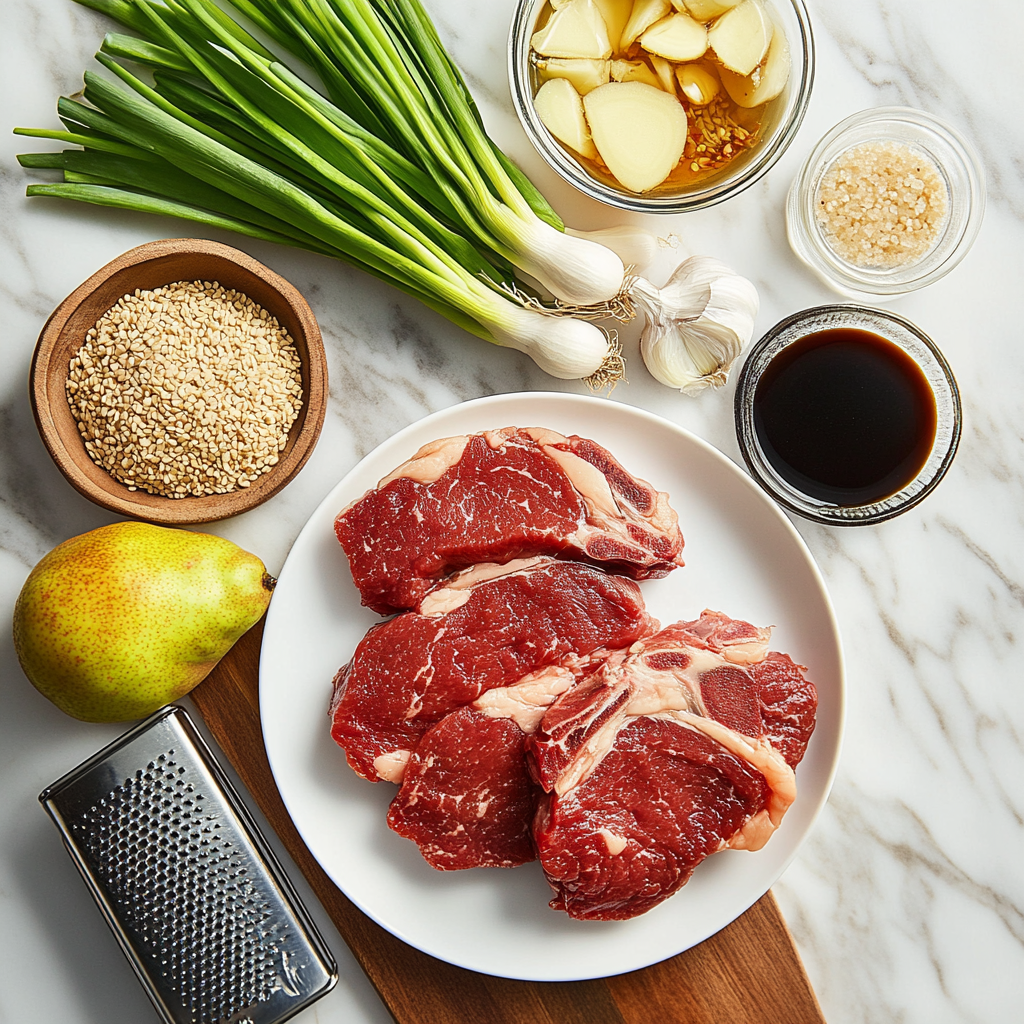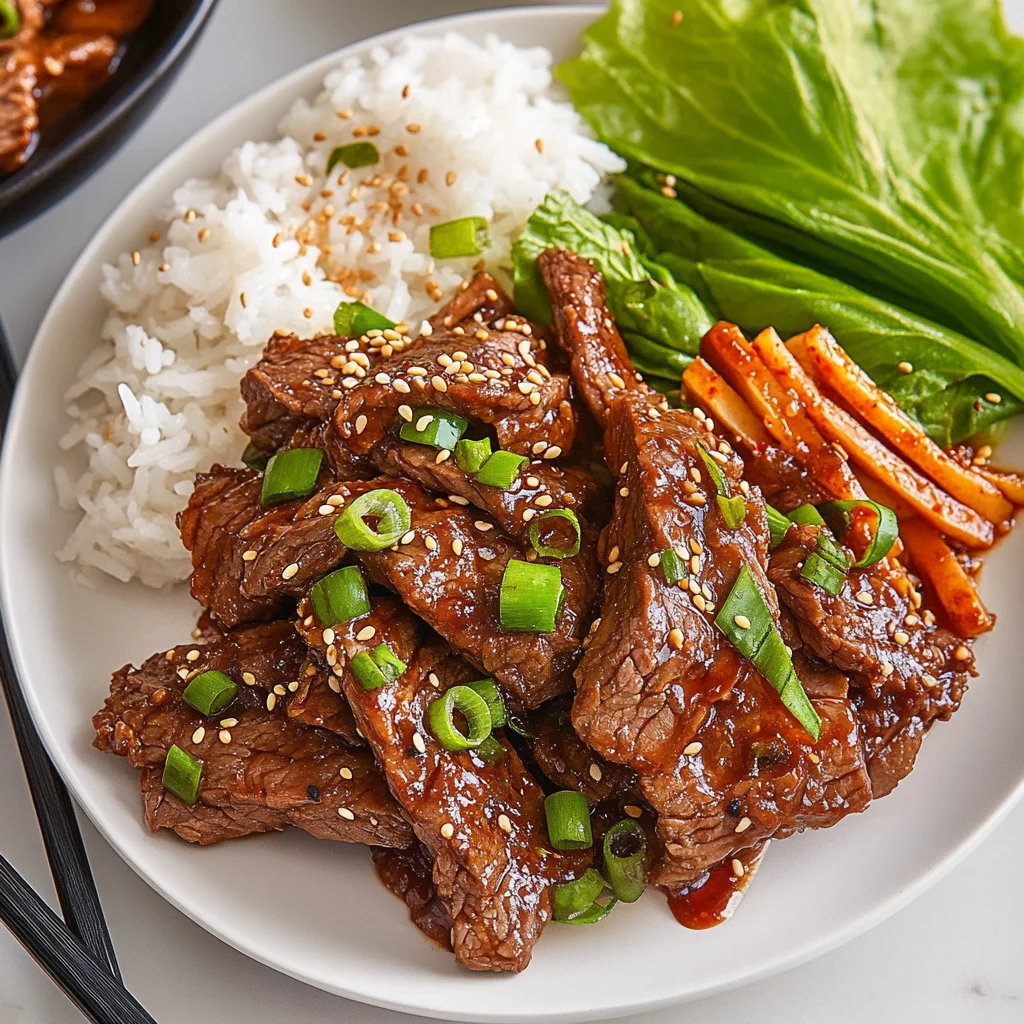Korean Beef Bulgogi is the perfect recipe for busy weeknights. Quick, easy, and bursting with flavor, this dish will become your go-to meal. Try it today!
Table of Contents
Let’s talk about dinner and why Korean Beef Bulgogi is the ultimate weeknight lifesaver. We’ve all been there: it’s 6 p.m., the kids are hungry, and you’re staring into the fridge wondering how to turn a handful of ingredients into something delicious. That’s where this Best Korean Beef Bulgogi recipe comes in.
This dish is like a flavor explosion in your mouth—tender slices of beef marinated in a sweet, savory, and slightly spicy sauce, grilled to perfection, and topped with fresh green onions and sesame seeds. The best part? It’s quick to prepare and uses simple ingredients you can find at any grocery store. Whether you’re a busy mom juggling a million things or a professional trying to squeeze in a workout after work, this recipe is your new best friend.
So, grab your apron, and let’s make dinner the best part of your day.
Why You’ll Love This Korean Beef Bulgogi
Before we dive into the recipe, let me tell you why this dish is a game-changer:
- Quick and Easy: With minimal prep and cook time, it’s perfect for busy weeknights.
- Flavor-Packed: The marinade—featuring soy sauce, sesame oil, garlic, ginger, and gochujang—delivers a perfect balance of sweet, savory, and spicy.
- Versatile: Serve it over rice, in lettuce wraps, or even as a filling for tacos.
- Crowd-Pleaser: It’s a hit with both kids and adults, making it great for family dinners or entertaining guests.
Cooking Tips
- Freezing the Steak: Don’t skip this step! It makes slicing the steak much easier and ensures thin, even pieces.
- Marinating Time: If you’re short on time, marinate the steak for at least 30 minutes. For deeper flavor, marinate overnight.
- Gochujang Substitute: If you can’t find gochujang, use sriracha or chili garlic sauce for a similar kick.
- Cooking in Batches: Avoid overcrowding the pan to ensure the steak gets a nice char.
A Little Story from My Kitchen
This Korean Beef Bulgogi recipe holds a special place in my heart. It was one of the first dishes I learned to make when I started exploring Korean cuisine. I remember the first time I made it for my family—they were skeptical about the pear in the marinade, but one bite was all it took to win them over. Now, it’s a regular on our weekly menu, and my kids even request it for their school lunches (hello, lettuce wraps!).

FAQs
Can I use a different cut of beef?
Yes! While rib eye is ideal for its tenderness, you can also use sirloin or flank steak. Just be sure to slice it thinly against the grain.
Can I make this ahead of time?
Absolutely! You can marinate the steak up to 24 hours in advance. Cook it just before serving for the best texture and flavor.
What can I serve with bulgogi?
This dish pairs beautifully with steamed rice, kimchi, lettuce wraps, or even a simple side of sautéed vegetables.
More Favorited Korean Recipes.
Korean cuisine is a treasure trove of bold flavors, comforting dishes, and vibrant colors that are perfect for any occasion. From the spicy kick of Kimchi Fried Rice to the crispy, sweet allure of Korean Fried Chicken, these recipes are sure to become family favorites. Whether you’re craving the hearty warmth of Kimchi Jjigae (kimchi stew) or the chewy, spicy delight of Tteokbokki (rice cakes), there’s something for everyone. These dishes are not only delicious but also approachable, making them ideal for busy weeknights or weekend feasts.
For those looking to explore more, Bibimbap offers a colorful and nutritious meal in a bowl, while Japchae (glass noodle stir-fry) brings a satisfying chewiness with every bite. If you’re in the mood for something indulgent, Korean BBQ Short Ribs (Galbi) or Dakgangjeong (sweet and crispy chicken) are guaranteed crowd-pleasers. And let’s not forget the comforting simplicity of Doenjang Jjigae (soybean paste stew) or the fun, shareable appeal of Haemul Pajeon (seafood pancake). Each dish tells a story of tradition and flavor, making Korean cooking a joy to explore.
Whether you’re a seasoned cook or just starting out, these recipes are designed to be easy, flavorful, and adaptable. Serve them with steamed rice, kimchi, or your favorite side dishes for a complete meal. So, grab your apron, fire up the stove, and let’s bring the vibrant flavors of Korea to your kitchen!
Quick Korean Beef Bulgogi
Course: DinnerCuisine: KoreanDifficulty: Easy4
servings15
minutes10
minutes380
kcalQuick Korean Beef Bulgogi: Tender slices of rib eye steak marinated in a sweet, savory, and slightly spicy sauce, grilled to perfection. Ready in under 30 minutes, this flavorful dish is perfect for busy weeknights or a special dinner. Serve with steamed rice and fresh toppings for a complete meal!
Ingredients
1 ½ pounds boneless rib eye steak
½ small pear, peeled and coarsely grated
¼ cup reduced sodium soy sauce
2 tablespoons brown sugar
2 tablespoons toasted sesame oil
3 cloves garlic, minced
1 tablespoon freshly grated ginger
1 tablespoon gochujang (Korean red pepper paste)
2 tablespoons vegetable oil, divided
2 green onions, thinly sliced
1 teaspoon toasted sesame seeds
Step-by-Step Instructions
- Wrap the steak in plastic wrap and place it in the freezer for 30 minutes. This makes it easier to slice thinly.
Unwrap the steak and slice it across the grain into ¼-inch thick slices. - In a medium bowl, combine the grated pear, soy sauce, brown sugar, sesame oil, garlic, ginger, and gochujang.
Place the sliced steak in a gallon-sized Ziploc bag and pour the marinade over it. Seal the bag and massage the marinade into the steak.
Let it marinate in the fridge for at least 2 hours (or overnight for maximum flavor), turning the bag occasionally. - Heat 1 tablespoon of vegetable oil in a cast iron grill pan over medium-high heat.
Working in batches, add the steak to the pan in a single layer. Cook for 2-3 minutes per side, flipping once, until charred and cooked through.
Repeat with the remaining 1 tablespoon of vegetable oil and steak. - Garnish the bulgogi with thinly sliced green onions and toasted sesame seeds.
Serve it immediately with steamed rice, lettuce wraps, or your favorite side dishes.
Nutrition Facts
- Calories: 380 kcal | Total Fat: 24g | Saturated Fat: 6g | Trans Fat: 0g | Cholesterol: 70mg | Sodium: 680mg | Carbohydrates: 12g | Fiber: 1g | Sugar: 8g | Protein: 30g
Recipe Notes for Korean Beef Bulgogi.
1. Prep Work Tips
- Freezing the Steak: Don’t skip this step! Freezing the steak for 30 minutes makes it easier to slice thinly and ensures even cooking.
- Marinating Time: For the best flavor, marinate the beef for at least 2 hours, but if you’re short on time, even 30 minutes will do. Overnight marinating works wonders for deeper flavor.
- Gochujang Substitute: If you can’t find gochujang (Korean red pepper paste), use sriracha or chili garlic sauce for a similar kick.
2. Cooking Tips
- Slice Against the Grain: Always slice the beef against the grain to ensure tender, bite-sized pieces.
- Cook in Batches: Avoid overcrowding the pan to get a nice char on the beef. Cook in small batches for the best results.
- Cast Iron Pan: A cast iron grill pan works best for achieving those beautiful grill marks, but a regular skillet will do in a pinch.
3. Ingredient Substitutions
- Beef: While rib eye is ideal for its tenderness, you can also use sirloin or flank steak. Just be sure to slice it thinly.
- Pear: The grated pear tenderizes the meat and adds sweetness. If you don’t have a pear, use kiwi or apple as a substitute.
- Gochujang: If you prefer a milder dish, reduce the amount of gochujang or omit it entirely.
4. Serving Suggestions
- Over Rice: Serve the bulgogi with steamed rice for a classic Korean meal.
- Lettuce Wraps: For a low-carb option, wrap the beef in lettuce leaves with a drizzle of ssamjang (Korean dipping sauce).
- With Side Dishes: Pair it with kimchi, pickled radishes, or a simple cucumber salad for a complete meal.
5. Storage and Reheating
- Refrigerator: Store leftovers in an airtight container for up to 3 days.
- Freezer: Freeze the cooked bulgogi (without garnishes) for up to 1 month. Thaw in the fridge overnight before reheating.
- Reheating: Warm it up in a skillet over medium heat or in the microwave. Add a splash of water or broth to prevent drying out.
6. Meal Prep Tips
- Prep Ahead: Slice the beef and prepare the marinade the night before. Store them separately in the fridge, then combine and cook when ready.
- Double the Batch: Make a larger portion and use the leftovers for bulgogi bowls, tacos, or fried rice later in the week.
7. Kid-Friendly Version
- Skip the gochujang or reduce the amount for a milder flavor.
- Serve with rice and let kids customize their bowls with toppings like shredded cheese, cucumber slices, or corn.
8. Why This Recipe Works
- Quick and Easy: Minimal prep and cook time make it perfect for busy weeknights.
- Flavor-Packed: The marinade delivers a perfect balance of sweet, savory, and spicy.
- Versatile: It’s great for rice bowls, lettuce wraps, or even tacos.
There you have it—The Best Chicken Enchilada Soup that’s quick, easy, and packed with flavor. Whether you’re cooking for a crowd or just need a cozy meal for yourself, this dish is sure to hit the spot. So grab your apron, fire up the stove, and let’s make dinner the best part of your day.
